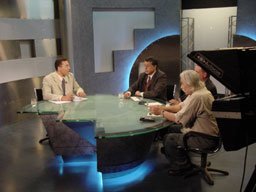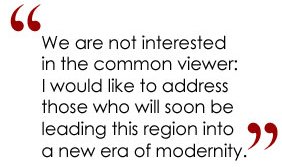
The possibility of the privatization or de-monopolization of television in Egypt has been much debated as the country makes steady steps towards a market economy. The year 2002 saw a more liberal government policy, enabling private ownership of satellite television stations and thus exhibiting a new tolerance and accommodation of different broadcasting forms. To date, five Egyptian private stations have begun broadcasting: El Tamima Shopping Channel, the Tourism Channel, Dream TV, Melodies, and El Mehwar TV.
After a year on air, El Mehwar TV continues to change programming formats in search of a station personality. Dr. Hassan Rateb, main owner and creator of the station, admits that El Mehwar is still in search of that special identity that will help it make its mark.
Rateb, perhaps better known as a developer and cement tycoon, got the idea for a television station when he realized that there was a strong need for a public arena for both the region's private sector and its civil society. "The space for democracy in our society is changing. This is a new sphere: with private ownership of such a powerful tool the public sphere is much wider," says Rateb.
According to Rateb, the private sector needs a voice because they are much attacked by the media, which has practiced systematic discrimination against the private sector, sometimes overt and sometimes covert. "Unfortunately," Rateb says, "the socialist way of thinking that was the reason for the collapse of the former Soviet Union is still very evident in this region. Many of our journalists, critics, and intellectuals are a product of the socialist legacy. One of the important missions of this station is to legitimize the private sector in Egypt. This is not to say that the private sector doesn't have its problems. There are negative aspects and positive aspects, but businessmen who are not paying their loans and running away from the country are not the full picture. The private sector needs a voice, their achievements and successes need to be represented, and El Mehwar is a vehicle for a genuine and important group in our society," he says.
Rateb, who believes that the station should prioritize the voices of individuals and social groups rather than the voices of government, also believes that El Mehwar's mission is to represent civil society. "I am not anti-government," insists Rateb, "but I believe that the voices of the members of society are important for a healthy nation and that is why I would like to secure better representation of civil society on El Mehwar."
It is perhaps because of this very specific philosophy that El Mehwar has changed programming content and management several times in its short history. El Mehwar went on air in early February 2002 as a free-to-air satellite television station broadcasting a mix of entertainment and current affairs programming aimed at audiences in the Arab market. However with much competition from other well-established Arab satellite stations, many of which have a decade of experience, El Mehwar's programming failed to attract viewership or to find a place for itself within the region's satellite spectrum.
Rateb is well aware that the station has not yet gained a loyal viewership. He is still trying to find the formula that will reflect his vision and philosophy. These uncertainties may lie behind the fact that, after handing over the entire production of the station to veteran journalist and owner of private news services company Video Cairo Sat Mohamed Gohar, disagreements soon surfaced, causing further ructions (disagreements which, in part, would lead to a definite break between Rateb and Mohamed Gohar after this article was written).
"I have a mission that I strongly believe in and I disagreed with Gohar over the airing of controversial folklore singer Shaaban Abdel Rehim's Shaabulla Show," says Rateb. "This is not in any way the kind of programming I aspire to have on the station. I have a certain mission that I strongly believe in and I will do what it takes to make my message clear," he says. Despite being criticized for making frequent managerial changes, Rateb feels that he should be allowed to take his time to get the right system going.
Following the Shaabulla incident, it seemed that Rateb was leaning towards having Gohar focus primarily on news services. "I believe that Gohar is very experienced and professional when it comes to news and this will be of much benefit to the station," says Rateb. He further revealed that he has plans to launch a second station that will be news oriented, offering real news coverage and in depth analysis. Gohar was expected to have played a played a major role in this. "I would like to have objective, fair, and balanced news on El Mehwar. What we have so far in the Arab region is either offensive, sensational news or protocol news reflecting the comings and goings of state leaders. El Mehwar wants to give the region 'real' news," says Rateb.
Gohar's entry strategy had detailed how to make the station's news programming inspiring and informative. Part of the actual production of live shows took place at the Egypt Media City Studio and some took place at Video Cairo Sat's Maspero headquarters. Both Gohar and his production staff have much experience and training in news production, including reporting, writing, filming, editing, and management. But that has all come to a halt. Gohar says that he pulled out, because, above and beyond the disagreements over content, Video Cairo Sat has not been paid.
Gohar's departure may be a serious blow to El-Mehwar. "I was lucky," says Gohar. "I worked with the best-Walter Cronkite, Barbara Walters," referring to his years with American television. Ambitious and thoughtful, Gohar, like Rateb, says he would have liked to provide better, more analytical coverage of political and economic issues and developments in the region than that currently available on other Arab television stations. He also had hoped to provide better coverage of events in other parts of the world that have a direct impact on the region, whilst retaining an Egyptian perspective.
Relying on his instinct as a successful businessman and his experience in management, Rateb plans to solve the dilemma of pursuing a large audience by offering them a more modern and diversified product. "We are broadcasting on both Arabsat and Nilesat and we aim mainly to target young educated professionals throughout the region," says Rateb. Since 60 percent of the population in the Middle East is under 30, that translates into an estimated audience of 300 million. However, Rateb notes that "We are not interested in the common viewer: I would like to address those who will soon be leading this region into a new era of modernity."
Gohar's view of El Mehwar appeared to be compatible with Rateb's, despite the fall out over the ill-fated Shaabulla Show and, now, over money. In Gohar's view, the station's philosophy was based on offering viewers attractive programming chiefly made up of entertainment, consisting of talk shows, games shows, and music shows, and analytical current affairs programming with a distinctly Egyptian flavor. "We have definitely lost our [Egypt's] place as a dominant media player in the region. Hopefully this is chance to regain that position," said Gohar before the split. Similarly, Rateb feels that the station has a very strong culture-that of Egypt-to draw upon in order to attract a loyal audience. "That is part of what will make us different from other stations in the Middle East," say Rateb. "Besides, no other station has our ideology, so we will definitely be attractive to audiences."
So far, however, despite the fact that the station has an ambitious plan to promote its owner's mission, management appears unsure of itself when it comes to what the audience would like to see, appearing to rely on instinct and hunches. There is little evidence that audience research has been carried out. Similarly, the pattern of continually shifting production house does not bode well for the stability and survival of the station.
As for competition, despite similarity in type of ownership and content between El Mehwar and Egypt's other private station, Dream TV, Rateb does not consider Dream to be a competitor. "I am competing with stations such as LBC, MBC, and ART," says Rateb. "We are very different from Dream TV, which has a different approach to ours. We are a serious, balanced station." However, broadcast media expert Professor Farag el Kamel, Chair of the Faculty of Radio and Television at Cairo University, feels that it is still too early for El Mehwar to be competing against other giant private Arab satellite TV stations, some of whom have had several years of experience.
On the question of financial viability, Rateb says that the 'value added' of owning a TV station is of greater value than instant financial gains, yet he admits that it is a costly project. Somewhat idealistically, Rateb seems to be mainly preoccupied with the realization of his philosophy and the quality of the content, despite the fact that financing is a primary challenge for a free-to-air channel that will inevitably have to rely on advertising for revenue. According to Rateb the station does have some advertising, though he is thinking of introducing the idea of private sponsorship of programming.
Now that Gohar, and Video Cairo Sat, have exited, some of the more popular shows are now on hold. For example, the future of the talk show El-Mahawer ("Axes"), hosted by Khaled Salah, which had built up a reputation for balance and seriousness, is currently under discussion. This program had augmented the Nile News-supplied briefs since the station launched, functioning as a platform for in-depth analysis of topics with pan-Arab impact and, more importantly, as a forum for public debate. A question mark also hangs over other popular programs, such as young anchor Menna Mostapha's 247 Music Show, Mazzikat ("Toons"), hosted by the young and talented Boshra and the prominent musician-composer Hani Shenouda, and "Warta," ("Unexpected Problem") hosted by the youthful Mohamed Shakankiri, a show that deals with day-to-day issues of interest to young people.
In any case, the station's programming was slated for yet another complete makeover, as of the beginning of the new year. Rateb says that he may even change the name of the station to the catchier "Sama," ("Sky"), the name of his other company group. "I am thinking about it, but I am hesitant because people are becoming accustomed to El Mehwar" he says.
This makeover is intended to include a financial overhaul: the capital of the company would be doubled from LE30 million to 60 million says Rateb. Regardless of the fact that Rateb has already lost many of the original investors, who fled after discovering that there wouldn't be a fast return on their investment, he insists that he has the ability to attract others. Currently, Rateb owns 65% of the station, another 18% is divided among a group of prominent Egyptian businesspersons including Hossam Badrawi, Raed Hashem, Nawal El- Digwi, Mostapha El-Salab and Samir El-Naggar, while the remaining shares are divided among the Egyptian Radio and Television Union (ERTU), Egypt Media City (EMC), and Nilesat. However, he is optimistic that once the station becomes successful, he will be able to sell stocks publicly and he aims to increase the capital to at least LE500 million.
Like other private Egyptian satellite television stations, El Mehwar is partly owned by the government through the compulsory stakes bought by ERTU, Nilesat and EMC. The station is, however, editorially independent. In fact, content regulations for commercial broadcasters are fairly limited; with the exception of a ban on inflammatory programming that may affect national or state sovereignty and on pornographic material, little is forbidden. There are also some bureaucratic restrictions, such as the need to obtain permission for filming from the State Information's Press Center or permission for setting up dishes for live transmissions. The general trend, however, appears to be towards declining censorship as Arab society becomes more democratic.
Rateb states that since the station went on air he has never had any government interference. "On the contrary, Minister of Information Safwat El Sherif has been extremely supportive of our efforts; I don't think there is any need to worry about intervention from the state," he adds, underlining his closeness to state authorities.
Gohar had agreed that he too was not worried about crossing any red lines. "The idea is to develop professional standards for accuracy and fairness in reporting," he declared. "When you do that, what problem can arise? The inability to distinguish between news and sensationalism is the most frequent cause of problems that other stations face. When you 'stick to the facts' you will not face any problems. The Middle East region is undergoing many changes and the media environment is becoming much more free and competitive."
According to human rights activist and President of the Centre for the Defense of the Freedom of Journalists Nedal Mansour, the addition of El Mehwar and Dream TV is welcomed by the region's media. Mansour said, "Both stations appear to be editorially independent and impartial, which is very important. It is doesn't matter if the government owns a small percentage of the station as long as the station's decisions and strategies are independent." Al Jazeera, in Mansour's opinion, is not an independent station in view of it's direct financing by the state. However, Mansour does feel that private TV must have its own news coverage to be truly independent, together with entertainment programming. He adds, however, that he has heard that both stations plan to expand into that area.
Public expectations have been raised considerably. Commercial private stations are growing throughout the region. Only time can tell whether El Mehwar will survive this latest crisis and compete against other commercial stations and state broadcasting, which continues to be the major player for most of the countries in the region.
Hanzada Fikry, media analyst and professor at the American University in Cairo, says that in terms of news quality El Mehwar has good chances of success. "The El Mahawer program in particular is of high quality and quite impressive. I think that El Mehwar as a station may be able to compete well with other stations in the long run, but they are not ready yet," she says. "As long as the investors keep it going until the station can sustain itself, it has much potential," she adds, " but I don't see it as a totally independent station. There may not be direct censorship but they certainly practice some self-censorship; they know where the red lines are."
 Arab Media & Society The Arab Media Hub
Arab Media & Society The Arab Media Hub




